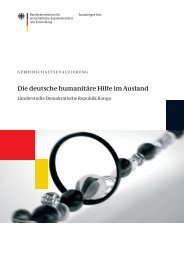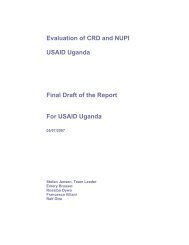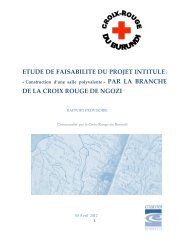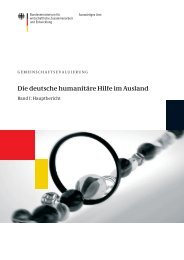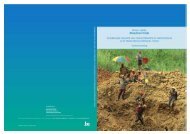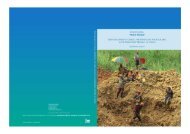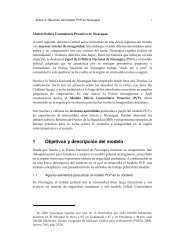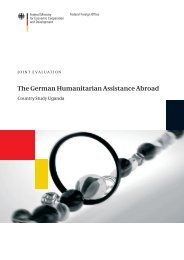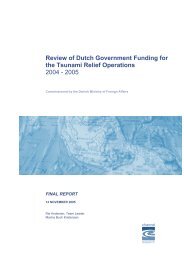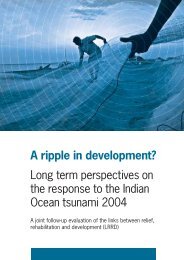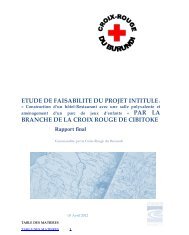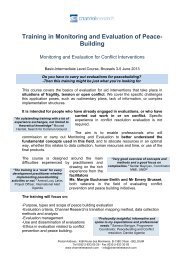Die deutsche humanitäre Hilfe im Ausland - Channel Research
Die deutsche humanitäre Hilfe im Ausland - Channel Research
Die deutsche humanitäre Hilfe im Ausland - Channel Research
Erfolgreiche ePaper selbst erstellen
Machen Sie aus Ihren PDF Publikationen ein blätterbares Flipbook mit unserer einzigartigen Google optimierten e-Paper Software.
that is known for humanitarian assistance<br />
in general due to the generally protracted<br />
nature of humanitarian crises and the<br />
short-term nature of the measures<br />
<strong>im</strong>plemented.<br />
Sustainability/connectedness<br />
Local capacities are crucial for the<br />
sustainability and connectedness of<br />
humanitarian assistance. Frequently the<br />
actors involved in German humanitarian<br />
assistance l<strong>im</strong>it themselves to the use of<br />
local capacities in various forms and<br />
functions. In some cases, especially in<br />
emergency relief and in extended<br />
emergency aid, certain measures still tend<br />
to take on “a life of their own” when<br />
<strong>im</strong>plementation by German<br />
<strong>im</strong>plementation partners continues.<br />
Although some examples of good practice<br />
do exist for capacity development<br />
measures, the potential has not yet been<br />
sufficiently exploited.<br />
Cross-cutting issues<br />
In general, there is much scope for<br />
<strong>im</strong>provement in terms of taking into<br />
account and realising cross-cutting issues<br />
in German-funded humanitarian<br />
assistance. The cross-cutting issues<br />
(human rights, gender, conflict<br />
sensitivity/do no harm, environmental<br />
soundness, HIV and AIDS as well as<br />
protection) are currently mainstreamed to<br />
varying degrees in German humanitarian<br />
assistance. While a number of these<br />
issues are taken into greater and more<br />
systematic consideration by international<br />
organisations, in some cases through<br />
organisation-wide initiatives, and while<br />
they are institutionally anchored within the<br />
Deutsche Gesellschaft für Technische<br />
Zusammenarbeit (since 1 January 2011<br />
the Deutsche Gesellschaft für<br />
Internationale Zusammenarbeit) through<br />
the DAC markers, the commitment of most<br />
non-governmental organisations to these<br />
cross-cutting issues is still rud<strong>im</strong>entary.<br />
Some have anchored the issues in their<br />
strategies, concepts and forms, indicating<br />
sensitivity to these issues, but this is still<br />
no guarantee that they will be<br />
appropriately realised. When projects are<br />
<strong>im</strong>plemented there are some specific<br />
activities for gender and conflict<br />
sensitivity/do no harm, but the issues are<br />
still not systematically taken into account.<br />
The potentials and capacities available<br />
within German humanitarian assistance<br />
and development cooperation<br />
organisations have not yet been<br />
adequately exploited.<br />
Linking relief, rehabilitation and<br />
development (LRRD)<br />
Although it is generally accepted that<br />
linking relief, rehabilitation and<br />
development must be seen as a<br />
contiguum, rather than a continuum, in<br />
practice the latter approach tends to<br />
dominate in the way actors think and act,<br />
and in the pertinent discourse. To date the<br />
LRRD debate in relation to German<br />
humanitarian assistance in fragile states is<br />
still not sufficiently dovetailed with<br />
engagement for a whole-of-government<br />
approach.<br />
A number of actors involved in German<br />
government-funded humanitarian<br />
assistance have a wealth of conceptual<br />
and practical experience in linking relief,<br />
rehabilitation and development and in<br />
conflict-sensitive cooperation in fragile<br />
states. The German government also has<br />
in place suitable mechanisms to respond<br />
appropriately in different contexts with its<br />
two specific budget lines for humanitarian<br />
emergency relief and developmentoriented<br />
emergency and transitional aid<br />
(adjustments need, however, to be made<br />
to the low commitment appropriations in<br />
the BMZ budget line for developmentoriented<br />
emergency and transitional aid).<br />
The German government does not,<br />
however, yet use these mechanisms and<br />
the specific potential they offer in a<br />
xv



